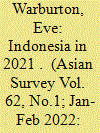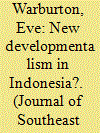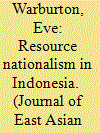|
|
|
Sort Order |
|
|
|
Items / Page
|
|
|
|
|
|
|
| Srl | Item |
| 1 |
ID:
185204


|
|
|
|
|
| Summary/Abstract |
A devastating wave of COVID-19 infections cast a long shadow over all political and economic developments in Indonesia in 2021. Many of the patterns and trends identified in this journal’s previous year-end analysis intensified in 2021, with a deepening of pandemic-induced crises, immense loss of life, and further erosion of democratic norms and institutions, including unprecedented intervention into a corruption watchdog and a major business association. The administration of president Joko Widodo has focused almost exclusively on economic development and business investment throughout the pandemic; but the spread of the Delta strain forced a shift in the government’s approach to lockdowns, prompting new concerns about rising poverty and inequality.
|
|
|
|
|
|
|
|
|
|
|
|
|
|
|
|
| 2 |
ID:
170995


|
|
|
|
|
| Summary/Abstract |
Indonesia is a country of significant inequalities, but we know little about how Indonesians feel about the gap between rich and poor. Comparative research suggests that negative perceptions of inequality can erode public support for democratic institutions. Using survey data, we explore the relationship between inequality and support for democracy in Indonesia. We find Indonesians are divided in their beliefs about income distribution. But this variation is not determined by actual levels of inequality around the country, nor by people's own economic situation; instead, political preferences and partisan biases are what matter most. Beliefs about inequality in Indonesia have become increasingly partisan over the course of the Jokowi presidency: supporters of the political opposition are far more likely to view the income gap as unfair, while supporters of the incumbent president tend to disagree—but they disagree much more when prompted by partisan cues. We also find that Indonesians who believe socio-economic inequality is unjust are more likely to hold negative attitudes toward democracy. We trace both trends back to populist campaigns and the increasingly polarized ideological competition that marked the country's recent elections. The shift toward more partisan politics in contemporary Indonesia has, we argue, consequences for how voters perceive inequality and how they feel about the democratic status quo.
|
|
|
|
|
|
|
|
|
|
|
|
|
|
|
|
| 3 |
ID:
162532


|
|
|
|
|
| Summary/Abstract |
Over the course of the past decade, Indonesia’s economic planning has become increasingly developmentalist in orientation. While aspects of this model have deep roots in the country’s history, a more self-conscious developmentalist agenda re-emerged during President Susilo Bambang Yudhoyono’s second term in office (2009–14). This paper suggests that under President Joko Widodo a new developmentalism has crystallized further and, arguably, become a defining feature of Indonesia’s political economy. To advance this argument, the paper draws upon studies of the “new developmentalism” in middle-income and emerging economies. This new developmentalism is characterized by a normative commitment to an activist state that can engineer fast economic growth, direct industrial upgrading, and ensure economic redistribution. However, developmental agendas should be distinguished from developmental outcomes. For Indonesia, state-led programmes for industrialization and inclusive economic growth have often fallen short. This study highlights some structural constraints upon the new developmentalism, with a particular focus upon politics. Specifically, it identifies patronage and clientelism as fundamental challenges to an effective state-led developmental model. Successive Indonesian governments, Jokowi’s included, have taken a conservative approach to the political problems that undermine their developmental goals.
|
|
|
|
|
|
|
|
|
|
|
|
|
|
|
|
| 4 |
ID:
156422


|
|
|
|
|
| Summary/Abstract |
During the global commodities boom Indonesia, like many resource-rich countries, introduced an increasing number of nationalist policy interventions. However, the state has intervened assertively in some sectors and only passively in others. In Indonesia's mining sector, interventions that compel foreign divestment received widespread support from politicians and domestic industry; yet similar proposals to limit foreign investment in the strategic agribusiness sector have largely failed. This article brings the literature on resource nationalism into conversation with studies of business–state relations, in order to understand why nationalist mobilization met with more success in Indonesia's mining sector than in agribusiness. It argues that ownership structures constitute the source of this variation. Uniquely integrated patterns of domestic and foreign ownership in the strategic palm oil sub-sector constrained lawmakers’ nationalist agenda. Such constraints were less formidable in Indonesia's mining sector, where foreign capital is more easily differentiated, and concentrated in a sub-sector that contributes less overall to the Indonesian economy.
|
|
|
|
|
|
|
|
|
|
|
|
|
|
|
|
| 5 |
ID:
103505


|
|
|
|
|
| Publication |
2011.
|
| Summary/Abstract |
The authors analyse the 2010 mayoral election in the city of Medan, North Sumatra. Medan is an ethnically and religiously diverse city and the authors treat the elections here as a case study of inter-communal dynamics in local elections in plural regions of Indonesia. The first round of the vote was contested by 10 pairs of candidates and occurred in a climate of cross-ethnic alliance building and appeals that, the authors argue, are typical of broader Indonesian patterns. The second round confronted voters with a choice between a Muslim candidate and an ethnic Chinese candidate who was also a Buddhist. There was a sudden switch in the tone and themes of the contest. A concerted campaign was launched to convince Muslim voters to support the Muslim candidate, with politicians and religious leaders alike suggesting that it was a religious obligation to do so. The campaign proved effective and the Muslim candidate, a member of the province's established political elite, won by a large margin. The article focuses on the campaign teams' strategies, analysing their electoral calculations and the techniques used to appeal to a multi-ethnic constituency. It also considers the role played in the poll by Medan's rich array of ethnic associations. The authors conclude by pointing to lessons of the Medan case for wider patterns of ethnic coalition building in Indonesia. They also describe this election as an example of the 'identity switching' that can take place when political actors choose from multiple and overlapping identity categories in changing political contexts.
|
|
|
|
|
|
|
|
|
|
|
|
|
|
|
|
|
|
|
|
|